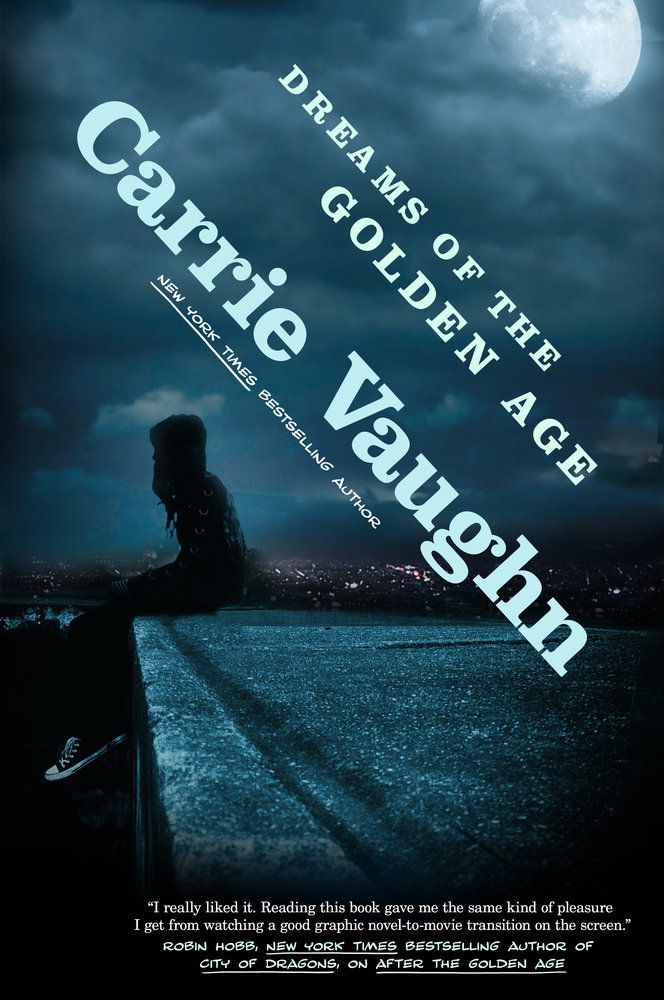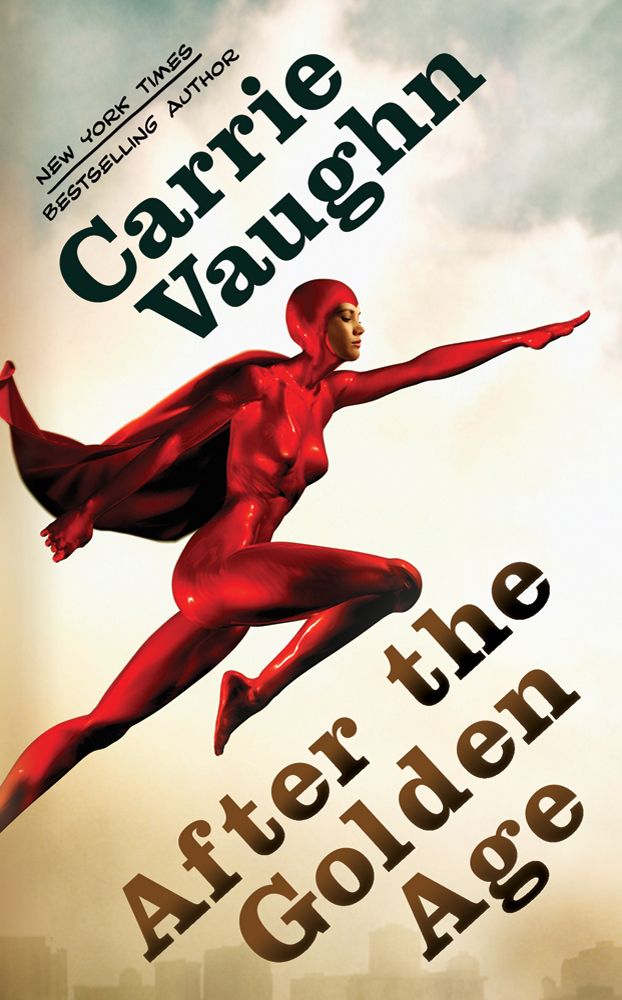Carrie Vaughn is well known for her novels, especially her urban fantasy series featuring werewolf Kitty Norville, and her short stories, including her contributions to George R.R. Martin's "Wild Cards" series. In 2011, she wrote the novel "After the Golden Age" which featured Celia West, the daughter of two superheroes, who was born without powers. Celia is an accountant -- which turns out to be a powerful skill in its own right -- and she manages to help foil a plot against the city and uncover its secret history as well as the origin of superheroes.
In her new book, "Dreams of the Golden Age," Vaughn returns to the world of "After the Golden Age" with an older Celia dealing with two daughters. The book alternates between Celia and her oldest daughter Anna, who is trying to keep her newfound powers a secret. Like the first book, "Dreams" is funny, thoughtful and offers a slightly different take on many of the superhero genre's tropes. Vaughn clearly loves superheroes and spoke with CBR News about the series, what comics have in common with novel series, urban fantasy and the heroism of accountants.
CBR: Carrie, what's your background with comics and superheroes? Were you a big comic reader when you were younger?
Carrie Vaughn: As a kid I read [Marvel's] "G.I. Joe" [by Larry Hama], and that was about it. I didn't get into superhero comics until college, when friends handed around dog-eared trade paperbacks of "Watchmen" and "The Dark Knight."
So no, I was never a big comic reader, but I didn't need to be to get into superheroes, because I grew up on Lynda Carter's "Wonder Woman" and all those great TV shows of the late '70s, and then graduated to the "Wild Cards" series of alternate history superhero anthologies edited by George R.R. Martin.
What made you first interested in writing about superheroes and why did you decide to focus on Celia, a non-superpowered character?
Like I said, I've always liked superheroes and superhero worlds. I was destined to write a superhero novel eventually. (I'm also now a contributor to the "Wild Cards" series, after being a fan from way back, so I get to write about superheroes a couple of times over.) I focused on Celia because she's the heart of the story -- hers is the story I wanted to tell, someone who was born into a superpowered world but doesn't have powers, who is grappling with not living up to her parents' expectations for her. She's the one who spends the story trying to find her place in the world, who is coming to grips with who she is and who she wants to be. That's where the story is.
How you got the idea for the heart of the book to be about accounting? It may not be key to the book's marketing campaign, but I think it seems very natural to go after a supervillain because of money -- that's how they jailed Capone, after all.
I first learned about forensic accounting when my mother, a CPA, uncovered an embezzling scheme at one of her bookkeeping jobs. I was a teenager at the time, and I thought it was about the coolest thing ever that my accountant mother was off fighting crime. As an adult, I spent eight years as an administrative assistant in an accounting office, so it's a world I know quite well. And seriously, the accountants are the ones who bring down ENRON, Madoff and so on. Accounting has a reputation of being supremely boring, but in fact, it's the code that a lot power in the modern world is written in. Think about how many secrets accountants are trusted with. It's an under-utilized backdrop for all kinds of thriller and mystery writing, I think.
What's one of your biggest challenges when working in a superhero universe?
Coming up with powers, concepts, and even names that haven't been used before. I especially spent time Googling for names. At the same time, I try not to worry too much about being original. I just try to put a new spin on familiar concepts and powers, and make my characters as vivid as possible so they don't remind people too much of other heroes. (For example, well after I'd written several stories about her I realized my "Wild Cards" character Curveball basically has the same power as Gambit. But she's so different a character, she's her own person, and I don't think anyone's noticed.) Especially with the "Golden Age" books, I'm writing about a traditional superhero world, so I felt fine using traditional, even stereotypical powers like pyrokinesis and super strength.
"Dreams of the Golden Age" is very different than "After the Golden Age." Did you always intend to write a sequel? How did the concepts evolve?
I wasn't sure at first I was going to write a sequel -- it depended on how successful the first book was. After writing the first book, I definitely had ideas for the next -- a big part of "After the Golden Age" is Celia dealing with her parents. I was curious to see what kind of mother Celia was going to turn out to be, and that gave me a launching point for "Dreams of the Golden Age."
You've written stories for your work in George R.R. Martin's "Wild Cards" series, but you're best known for the Kitty Norville series of books. Why do you think superhero stories and urban fantasy are so similar?
Urban fantasy and superhero stories have a lot in common because they usually take place in familiar, contemporary settings -- it's our world, with changes, like the existence of vampires, magic, or superpowers. Because of that, a lot of the worldbuilding challenges between the two genres are quite similar -- dealing with what things would be the same, and what would be different, for example.
Most urban fantasy series -- like Kitty Norville -- do function much like comics in that they're both serialized. In terms of crafting a follow-up to "After the Golden Age," what was your process behind differentiating it from other urban fantasy series?
I turned down an offer from an editor who basically wanted to turn "After the Golden Age" into an urban fantasy series, and I definitely wanted to do something different. It wasn't so much out of a specific desire to do something different as it was knowing that "Dreams of the Golden Age" was going to be different -- I needed the big jump in time so I could show Celia's daughters as teenagers, and turn the tables on her. That was the story I wanted to tell, so I had to set up the series differently to be able to do that. The story definitely drove it.
Are there any plans for a sequel to "Dreams?"
I have some ideas! I'm still in the early stages, so no concrete news about it yet, but I'm letting the ideas percolate.
Do you still read comics? Are you a fan of anything right now?
I do still read comics! Mostly what I seem to be doing these days is waiting for a few years to see what's out in trade that people are excited about and talking about. There's really nothing I'm following issue to issue right now, though comixology might change that -- that's been a good resource for discovering new titles lately. My very favorite thing I've read recently is "Planetary," by Warren Ellis and art by John Cassady. Because I discovered it late, I got to read it all in one sitting, and it's just brilliant, very meta but still a cohesive story all on its own. And I still pick up "G.I. Joe" every now and then.
If Marvel or DC said, "We've tried cops and spies and soldiers in a superpowered world, what we need is an accountant in a superpowered world," should they give you a call?
Absolutely! I think following the money trail of guys like Lex Luthor and Doctor Doom is a great untapped source of storylines.
"Dreams of the Golden Age" is available now.



